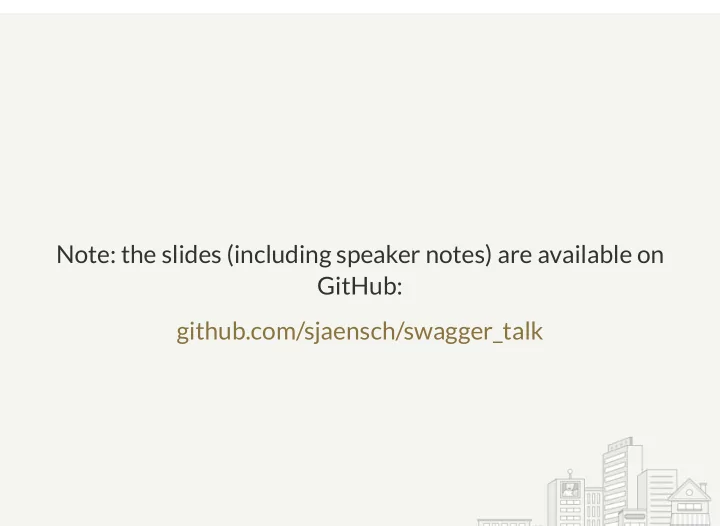

Note: the slides (including speaker notes) are available on GitHub: github.com/sjaensch/swagger_talk
BUILDING SERVICE INTERFACES WITH OPENAPI / SWAGGER Stephan Jaensch sjaensch@yelp.com / @s_jaensch
YELP STATS (Q1 2016)
WHAT THIS TALK IS ABOUT What is OpenAPI / Swagger Short introduction of some of the available libraries The things the tutorials typically don’t talk about
WHY OPENAPI / SWAGGER RESTful API speci�cation and tooling Solves several problems when faced with building services
PYTHON SUPPORT bravado swaggerpy pyramid_swagger connexion django-rest-swagger
--- swagger: "2.0" info: version: "1.0.0" title: "User service" host: "user-service.com" basePath: "/api" schemes: - "http" consumes: - "application/json" produces: - "application/json" paths: /users: get: summary: List users by IDs operationId: list_users tags: - user parameters: - name: "user_ids" in: "query" description: "IDs for which to return user objects" required: true type: "array" items: type: "integer"
responses: "200": description: "A list of users" schema: type: "array" items: $ref: "#/definitions/User" default: description: unexpected error schema: $ref: "#/definitions/Error" definitions: User: type: "object" required: - "id" - "username" properties: id: type: "integer" username: type: "string" business_id: type: "integer"
editor.swagger.io
swagger.io/swagger-ui/
USING BRAVADO from bravado.client import SwaggerClient from bravado.fido_client import FidoClient user_client = SwaggerClient.from_url( 'http://service_host:port/swagger.yaml', http_client=FidoClient(), ) user_future = client.user.list_users(user_ids=[1]) business_future = client.business.list_bizs(business_ids=[1]) user = user_future.result(timeout=DEFAULT_TIMEOUT) business = business_future.result(timeout=DEFAULT_TIMEOUT)
"WAR STORIES"
1. DEALING WITH NETWORK ISSUES @retry(tries=3, exceptions=[fido.exceptions.HTTPTimeoutError]) def retry_result(future): return future.result(timeout=2) future = client.user.list_users(user_ids=[1]) # redo the request in case of network failure… right? result = retry_result(future)
2. NULL VALUES FOR OPTIONAL FIELDS { "id": 1, "username": "john", "business_id": null } client = SwaggerClient.from_url( 'http://service_host:port/swagger.yaml', config={'validate_responses': False}, )
3. CREATING THE CLIENT MAY KILL PERFORMANCE import time from bravado.client import SwaggerClient time_start = time.time() client = SwaggerClient.from_url( 'http://169.254.255.254:20666/swagger.json', ) print(round(time.time() - time_start, 2)) >>> 1.60
4. ISSUES WITH DEPLOYMENT AT SCALE
4.1 ADDING A NON-OPTIONAL FIELD TO THE RESPONSE 1. Add it as optional to the spec, ship implementation 2. Change the spec to mark it as required
4.2 REMOVING A REQUIRED FIELD FROM THE RESPONSE 1. Remove it from the spec 2. Ship implementation (Don't do that)
4.2 REMOVING A REQUIRED FIELD FROM THE RESPONSE
4.3 ADDING A REFERENCE TO A NEW SPEC FILE 1. Add the �le 2. Add the reference to it Or let pyramid_swagger combine the spec for you
5. CHANGING THE TAG OF AN ENDPOINT future = client.user.list_users(user_ids=[1]) tag --^ ^-- operationId
CONCLUSION 1. When in doubt: version it 2. Deal with the network "Graceful Degradation when Services Fail" by Daniel Riti @PyCon 2016 3. Rolling forward and backward is not instantaneous 4. Be mindful of the differences between swaggerpy and bravado 5. Don't do services if you don't have to
OTHER TALKS BY YELPERS "Asynchronous network requests in a web application" by Lauris Jullien; Thursday, 10:30, A1 Watch the video for "Protect your users with circuit breakers" by Scott Triglia; Tuesday, 14:00, A2
QUESTIONS? sjaensch@yelp.com / @s_jaensch
Recommend
More recommend